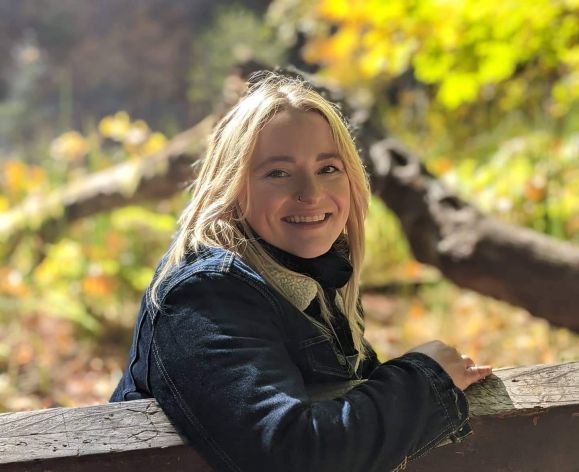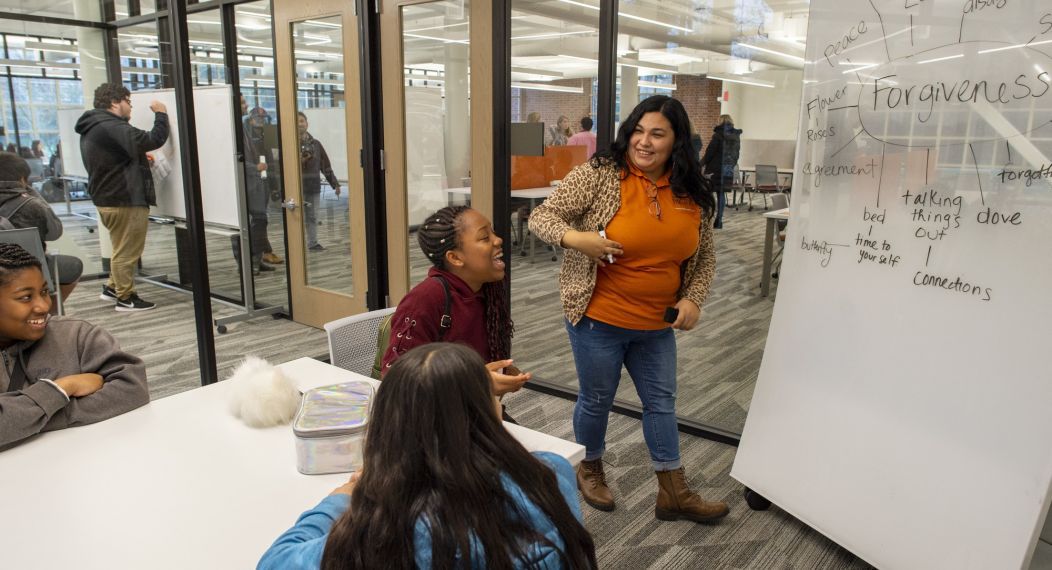
Graduation Year: 2017
Major: Sociology
Minor: Psychology and gender studies
Current job: Housing Representative for California Department of Housing and Community Development
Michelle is a Stockton native and University of the Pacific has always been a part of her community. She had been drawn to the campus since she was a child and throughout high school. When her dream to attend Pacific became reality, she decided to major in psychology and become a therapist. Little did she know that the opportunities she would be afforded during her freshman year would change her intended trajectory and she would become a team leader working on building more inclusive and environmentally conscious communities.
Could you describe your current job?
I work for California Department of Housing and Community Development. The goal of my program is to reduce greenhouse gas emissions through housing and transportation developments.
We're not only building this huge apartment complex for lower income individuals, but we are also building bike ways, green ways, trying to create electric fleets for buses so you're not just using public transit which reduces emissions but you're also using public transit that runs on electricity.
What Pacific experience prepared you most for your current career?
I'm working as the project manager for multiple housing and transportation developments. I feel like Pacific really prepared me for community development work, especially my sociology degree, because it provided me a greater context about the issues across not just the state of California, but the United States, and how we can problem-solve and figure out ways to better initiate change.
Why did you decide to choose sociology and the two minors?
I was going into Pacific as a psychology major to become a therapist. In my freshman year, I had to take some extra prerequisites and I got my first class in sociology. I started to fall in love with sociology and one class became two classes, which became three classes and then I realized I had to pick one. My love for sociology won out but I had already done so many psych courses that I ended up getting a psychology minor and then my sociology courses fulfilled the gender studies minor so it just all kind of played into one another.
What in particular attracted you to gender studies?
When I started in sociology, I fell in love with learning more about the world around us, the culture and how culture impacts our behavior. And that led to my gender studies minor and learning more about how we identify and the importance of identifying. The importance of that or the lack of importance of gender identity. Also, why we hyper fixate on gender or why don't we, and why it is important in our everyday culture.
So, I think that gender studies was an extended factor of my already growing education of sociology and they really played hand in hand. I can see this now at my work. I put my pronouns in my signature block, others do as well. We have an LGBTQI committee at work and they have helped highlight ongoing housing issues affecting LGBTQI community. I think that my gender studies background really helped play into some of that education that I’m still receiving in my workplace. Pacific helped me understand various activist movements, as well as issues that still impact us today and have impacted us negatively throughout history.
How is the knowledge you gained from gender studies playing into creating better camaraderie with your coworkers?
I think that when you're leading or working with a team, it's always important to really get to know each individual and how they play into the collective when we're completing work projects. You can't have a solid team if you don't support the little units that make it up. And so, you can start by asking, “Hey, how do you identify, what is your pronoun?” or “Is there a passion that you have?”
In your opinion, what is most special or most unique about Pacific education?
Pacific offers students more one-on-one care compared to other universities, especially when it comes to professional development. A lot of my friends who graduated from Pacific received internships that turned into solid job opportunities afterwards.
Pacific is really good at resume building. The Career Resource Center is very unique compared to other universities, the fact that we can still utilize that resource after we graduate is huge. I feel like you're not just there to receive education but also use it, so I really appreciated that aspect of attending and having various growth opportunities throughout college and then afterwards.
Was there one class or one professor that was particularly impactful?
I have to give all the praise and love to Professor Susan Mannon. She was the one who really put this passion of sociology inside of me, she was also an amazing professor to lay it out how it is and prepare me for the real world.
When I was a senior, usually professors are asking you to create these lengthy essays and she said no, that's not part of the real life. She wanted us to synthesize what would be in a lengthy essay to five minutes. She wanted it to be two pages maximum and she wanted us to give a five-minute presentation but expected it to be just as much as that. In the real world you only have a couple of minutes to persuade somebody, and so I really appreciated that, and I carried that lesson on moving forward.
She also got us in contact with various people afterwards with different careers. It offered us an opportunity to see options because you don't know where life is going to take you. So, I really appreciated her offering a real-life insight and also challenging us in the educational setting.
Was there a particular experience with your minor in gender studies that has really stayed with you?
There was one class that I had taken up which I believe accounted for both my sociology and my gender studies, but I do not remember its name. It was basically going over the culture of society, why we choose certain behaviors and how it plays into economics. I remember it so much because we had to play a game of Monopoly where each group of students had a different board, and we didn't realize that. Some team members were like oh, we're getting so much money, how is this happening? Other team members were like, I'm still stuck at point A. So, the teacher kind of messed with each of the teams’ boards but it was to show us various class backgrounds and how that plays into your economic movement forward.
Is there anything that you would like to mention to our current and future students?
I would like to emphasize that they should continue to take unique opportunities, regardless of what you originally thought the trajectory of your life should be. For me, when I first started, I thought I was going to be a therapist and then I thought I was going to be a case worker and then I ended up in local government and urban planning and I’ve just had so many different work experiences and working at various levels of the community. I would say, embrace it all. You just never know where the next opportunity is going to land you and I have definitely enjoyed having these various experiences.




